Activity Reports:Japanese-Language Education Overseas:Report on the "SAKURA Core Project" Group-Tour Program for Educators 2008-2009
Sakura Network Section
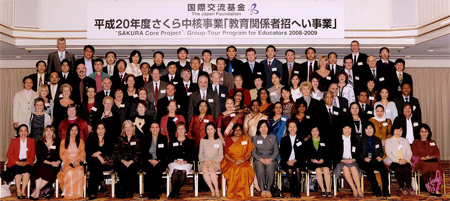
In March 2009, the Japan Foundation invited 87 educators from 15 countries to Japan for 10 days. The majority of the participants hold important positions within the educational sector of their countries, such as administrators in charge of foreign-language education and the principals of schools with Japanese-language classes.
In our current international society, in which an ever-increasing importance is being placed on multiculturalism and the ability to understand other cultures, learning a foreign language, including Japanese, is an effective way to obtain such ability. This program was carried out with the aim of having the key people within the educational field overseas experience Japanese culture and society first hand, think about Japanese education, and strengthen their partnerships with the Japan Foundation.
The program featured a wealth of content over the span of a 10-day stay in Japan. The participants received lectures on the themes of Japanese-language education overseas, the Japanese education system, and foreign-language education in Japan. The participants took a Japanese class, experienced Japanese culture, and visited schools and Japanese-language institutions.
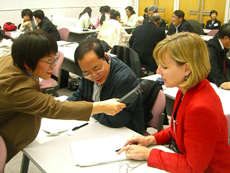 The Managing Director of the Japanese-Language Department of the Japan Foundation gave a lecture on the current state of Japanese-language education that provided information to encourage the participant's interest in the topic. The Managing Director explained the activities of the Foundation concerning Japanese-language education and the development of "the JF Standard for Japanese-Language Education." There was a lively exchange of opinions and questions in view of the situation regarding Japanese-language education in their own countries among the participants. Additionally, the participants visited Japanese-language institutes affiliated with the Foundation, had exchange meetings with trainees and instructors, and received an introduction to available educational resources being developed by the Japan Foundation, including some resources available on the Internet.
The Managing Director of the Japanese-Language Department of the Japan Foundation gave a lecture on the current state of Japanese-language education that provided information to encourage the participant's interest in the topic. The Managing Director explained the activities of the Foundation concerning Japanese-language education and the development of "the JF Standard for Japanese-Language Education." There was a lively exchange of opinions and questions in view of the situation regarding Japanese-language education in their own countries among the participants. Additionally, the participants visited Japanese-language institutes affiliated with the Foundation, had exchange meetings with trainees and instructors, and received an introduction to available educational resources being developed by the Japan Foundation, including some resources available on the Internet.
The participants themselves also took a Japanese-language class. The class was conducted using the "direct method," in which class occurs solely in Japanese, without interpretation. Although it was the first time for them to study Japanese, at the end of the 90-minute class, all of them were able to introduce themselves in Japanese. Comments such as, "It is a very important experience for language educators to experience being a learner" and "This is an excellent example of how Japanese should be taught" were heard from many of the participants.
As the participants are committed to education in their own countries, the lectures on the "Japanese educational system" covered a theme they were well acquainted with. There were many technical questions raised by the participants, on the educational system and curriculum within Japanese schools, the number of hours per class, and the number of classes per year. Some participants expressed surprise upon hearing that English-language education has not been included in elementary-school curriculum to this point and it will be introduced to elementary schools from 2010. There were also statements questioning if too strong an effort to introduce a foreign language from an early stage would lead to a decline in the student's ability to use their native language.
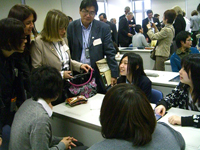 The participants received warm welcomes from the elementary and high schools they visited. They were able to interact with the teachers and students of the schools, sit in on classes, and try school lunches. It was heard from the participants that they were able to see where the cooperativeness, cleanliness, and high organizational abilities of the people of Japan come from.
The participants received warm welcomes from the elementary and high schools they visited. They were able to interact with the teachers and students of the schools, sit in on classes, and try school lunches. It was heard from the participants that they were able to see where the cooperativeness, cleanliness, and high organizational abilities of the people of Japan come from.
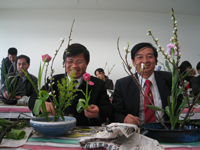 In order to broaden and deepen the interest and understanding of the participants toward Japan, the program included visits to Akihabara, Asakusa, and Kyoto, and also gave them the chance to experience traditional culture through such activities as tea ceremony and flower arrangement. These allowed the participants to understand and experience Japanese history as well as modern Japan.
In order to broaden and deepen the interest and understanding of the participants toward Japan, the program included visits to Akihabara, Asakusa, and Kyoto, and also gave them the chance to experience traditional culture through such activities as tea ceremony and flower arrangement. These allowed the participants to understand and experience Japanese history as well as modern Japan.
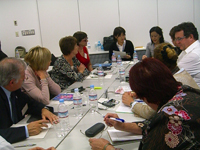 As a wrap-up at the end of the 10-day stay, the participants were split into small groups by country for an exchange of opinions with the staff of the Foundation. The participants expressed concrete wishes and ideas for future initiatives, such as a system for Japanese-language teacher exchange and for the acquisition of information regarding Japanese-language education materials. Additionally, the participants expressed the strong intention to link up with the Foundation's overseas offices after returning to their home countries for the pro-active pursuit of projects on Japanese-language education.
As a wrap-up at the end of the 10-day stay, the participants were split into small groups by country for an exchange of opinions with the staff of the Foundation. The participants expressed concrete wishes and ideas for future initiatives, such as a system for Japanese-language teacher exchange and for the acquisition of information regarding Japanese-language education materials. Additionally, the participants expressed the strong intention to link up with the Foundation's overseas offices after returning to their home countries for the pro-active pursuit of projects on Japanese-language education.
It is the Foundation's hope that by providing the participants the opportunity to know about Japan and think about Japanese-language education through participation in this project, a new network will be developed that will lead to the further development of Japanese-language education overseas.
Related Articles
Back Issues
- 2024.3. 4 Movie Theaters aroun…
- 2023.4.10 The 49th Japan Found…
- 2023.3.28 JF's Initiatives for…
- 2023.1.27 Living Together with…
- 2022.11.16 Inner Diversity <…
- 2022.6.21 The 48th Japan Found…
- 2022.3.22 JF's Initiatives for…
- 2022.3.14 JF's Initiatives for…
- 2022.2.14 JF's Initiatives for…
- 2022.2. 4 JF's Initiatives for…

